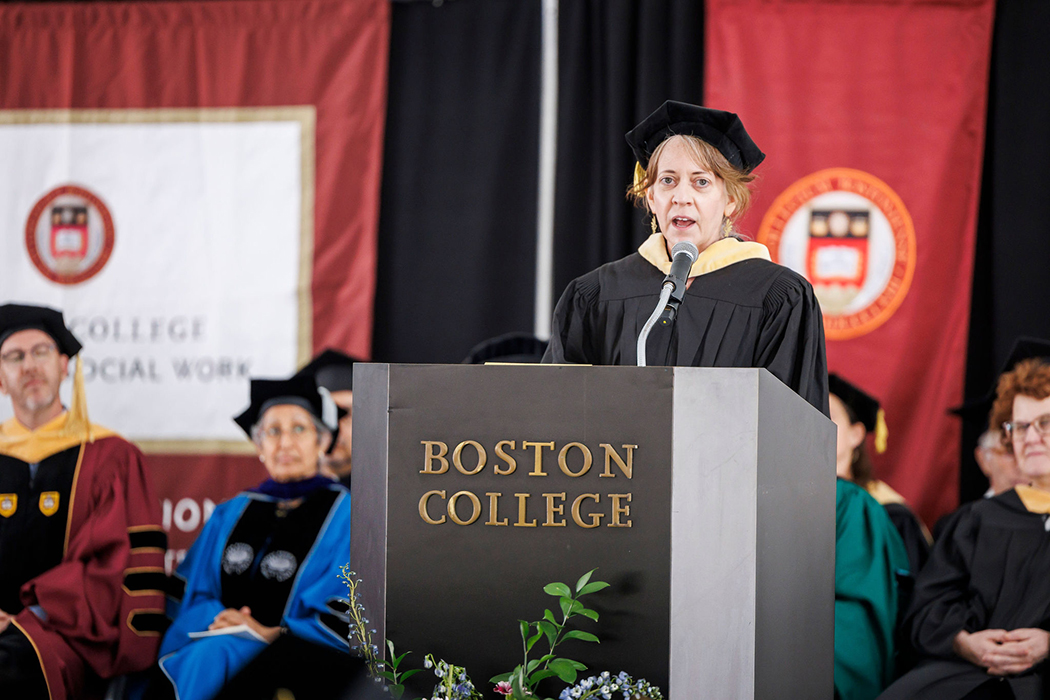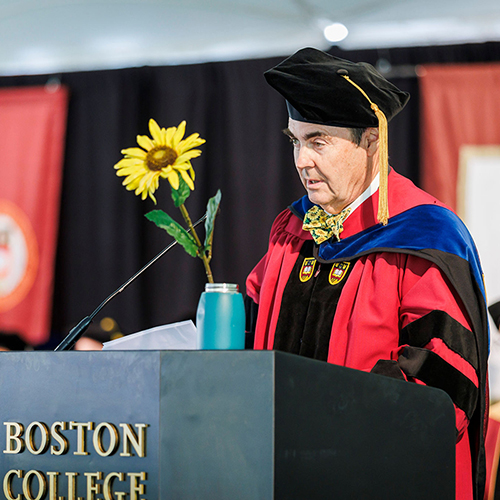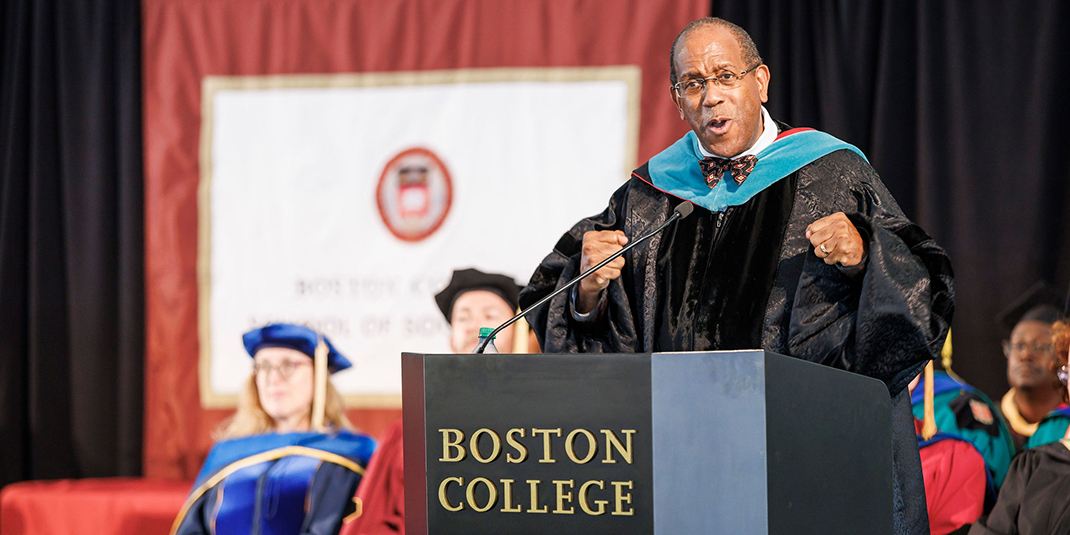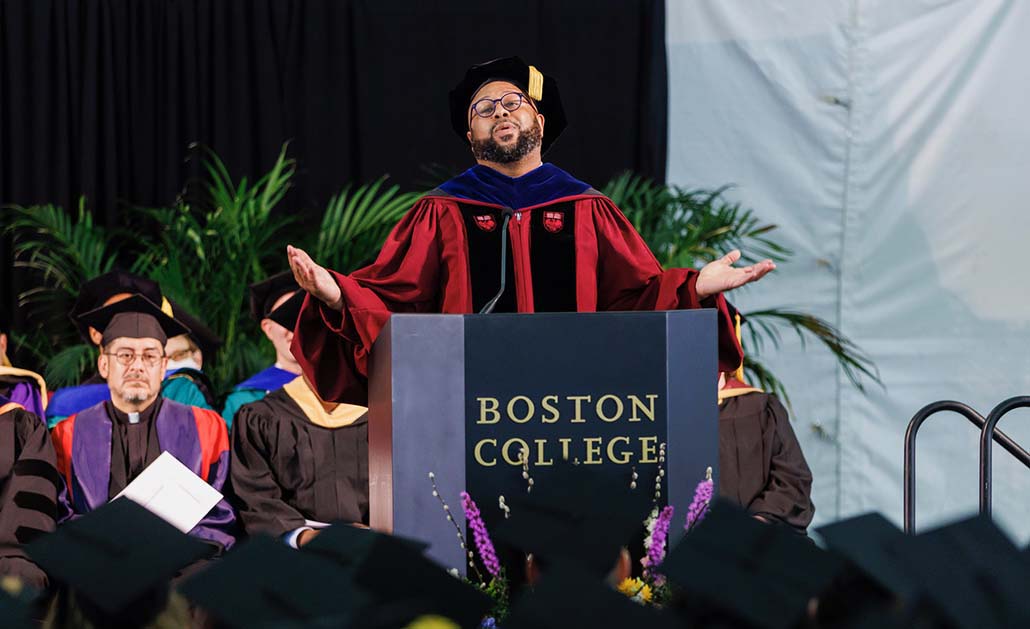
Rachael Dietkus, a designer, clinical social worker, and certified trauma specialist, delivered the keynote address at the diploma ceremony for the Boston College School of Social Work. Photos by Tim Correira.
Rachael Dietkus, a designer, clinical social worker, and certified trauma specialist, urged graduates to leverage the power of design to build a safer, more just, and more humane future on Monday in the diploma ceremony for the Boston College School of Social Work.
“Be the social workers who design. Design for safety. Design for repair. Design for futures that are rooted in an ethic of care,” said Dietkus, the keynote speaker, who founded Social Workers Who Design, a design advocacy studio where she works at the intersection of social work, design, and technology to promote ethical, trauma-responsive research and practices in the government, healthcare, and social impact sectors. “Challenge all the defaults. Question the status quo. Ask the better questions. Use design, care, and ethics as your methods of resistance and as your tools for building other tomorrows.”
Her fellow speakers shared similar words of wisdom, imploring the graduates to apply the lessons, skills, and knowledge they have accumulated at BCSSW to build a more equitable world. Remarks were frequently punctuated by whoops and cheers from an audience of more than 1,000 people who filled a big tent on the lower campus lawn to watch more than 240 graduates receive diplomas wrapped in gold and maroon bows.
BCSSW graduates celebrate at the diploma ceremony.
Flanked by two large banners emblazoned with the BC seal, Dietkus told the newly minted social workers that they have a responsibility to redesign broken systems that have failed to improve the health and well-being of individuals, families, and communities worldwide. It is their duty, she said, to turn these systems, built for efficiency, compliance, and control, into systems focused on equity, justice, and healing.
“As social workers, we have a role and a responsibility to reimagine and redesign them,” said Dietkus, who is in the process of writing a book that will explore how design can facilitate healing, particularly in public interest technology. “That requires us to see design not as something that is separate from social work, but truly a natural extension of it.”
She shared a vision of the future in which every social worker is also a designer—in which those in the helping profession are actively designing solutions to the most intractable social problems of our time, working to repair what’s broken and reimagine what’s possible through new approaches to care.
And it’s not a pipe dream.
“As social workers, we do that every single day. We are designing access. We design responses to crises. We design moments of trust, dignity and repair,” she said. “Social workers are designers, whether we know it or not, and regardless of anyone giving us that title.”
BCSSW Dean Gautam N. Yadama told graduates that they are uniquely equipped to collaborate with communities to design lasting solutions to complex social challenges.
In his remarks, BCSSW Dean Gautam N. Yadama told graduates that they are uniquely equipped to collaborate with communities to design lasting solutions to complex social challenges.
“Your extensive academic and practical training, coupled with your passion for enhancing the lives of the most vulnerable, is in high demand due to the social challenges we face and the complexity of those challenges,” he said.
Yadama also advised the graduates to develop five key traits that would enable them to effectively engage with complex social systems, helping to better support impoverished families, integrate immigrants into new communities, improve access to affordable housing, and more.
These traits, he said, are self-awareness, self-regulation, motivation, empathy, and social skills.
He placed particular emphasis on the importance of strong social skills for social workers aspiring to lead, saying that building meaningful partnerships with communities is essential to improving the conditions in which people live, learn, and thrive.
“You must persuade, build community, and build teams,” he told the graduates. “You must manage relationships and find that common ground because no one gives you the keys to the kingdom to go it alone. You have to go and do it with others.”
Audience members cheer on the graduates.
One of the graduates that Yadama addressed was Ximena Mancilla Delgado, who delivered the class greeting.
Like Dietkus and Yadama, Delgado encouraged the graduates to use their training as social workers to make the world a better place.
“In moments of crisis, social workers are the ones called in,” she said. “We are the ones who are at the forefront standing with communities when they need us most.”
As Delgado reflected on her own experience at BC, she recognized that each time she encountered a challenge, it was a social worker who stepped in to support her. In particular, she highlighted the professors who guided her through her coursework, the mentors who encouraged her to focus on her strengths, the supervisors whose feedback pushed her to grow in unexpected ways, and friends who offered a safe space to be herself.
Delgado closed her speech by invoking the teachings of bell hooks, a cultural theorist who insisted on using all lowercase letters in her name and once opined that collective healing is more effective than individual isolation.
“Social work is more than a career. It is a movement. It is a commitment to show up for people, to use our privilege to center the voices of those we work with, and to build a world where no one has to struggle alone,” Delgado said. “As we’re working toward that vision, social work can be the space where collective care replaces isolation and where the systems honor community over individualism.”
Ximena Mancilla Delgado delivered the class greeting.
Following the speeches, the School awarded diplomas to 246 graduates, including 240 who earned master’s degrees and six who earned doctoral degrees.
Eleven students who graduated from the master’s program received named awards for their outstanding contributions in the classroom, the community, and their fields of practice.
Annette Fournier and Anna Claire Rhyne received the Dean’s Leadership Award, which is granted to a pair of students who have shown a deep commitment and dedication to championing student voices at BCSSW.
Matthew Davis and Ben Farber received the Equity Justice and Inclusion Award, which is given to two students who have exhibited extraordinary leadership in advancing the work of the School’s EJI committee.
Anita Peete received the Afrocentric Field of Practice Award, which is given to a student who has demonstrated a commitment to excellence in working holistically toward a critical examination of social work from an African-centered perspective in their academic and field performance.
Avery DeWalt and Anna Seraikas received the Matthew L. Pisapia Memorial Award, which is granted to two students who have demonstrated academic excellence and leadership in the field of Children, Youth, and Families. The award was established through gifts from family and friends in memory of Matthew Pisapia, director of Field Education from 1969 to 1984.
Vanja Pesic received the Leo P. Haley and Reverend John Essien Memorial Award, which is given to a student who has demonstrated academic excellence and leadership in Global Practice. This award was established through a gift from Mary Hogan, former assistant to the dean of the School of Social Work, and is named after two tragically short-lived graduates, one from Greater Boston and one from Nigeria, who were especially gifted in breaking down barriers to communication, justice, and peace.
Nina Sachs and Kendall Swanson received the M. Rita Walsh Memorial award, which is granted to two students who demonstrate excellence in their academic and field performance in Health and Mental Health. The award was established in honor of Walsh, a devoted alumna of the Class of 1940, by her sister, Mary Ruell, and friend, Margaret Winne.
Adriana Rios received the Latinx Communities Award, which is given to a student who has demonstrated a commitment to excellence in working with Latinx communities toward sustainable solutions for complex problems in their academic and field performance.
Speakers urged the newly minted graduates to harness the power of design to help build a more just, humane future.
After graduates received their diplomas, Jesuit priest and Assistant Professor Alejandro Olayo-Méndez offered a benediction in Spanish and English.
“May the creator of this vast universe keep you safe as you go forth from this place that has nourished your mind and your spirit,” he said in part. “May the Almighty look down upon you and give you success in all your endeavors, understanding in all that is new to you, and certainty that you are deeply loved.”




